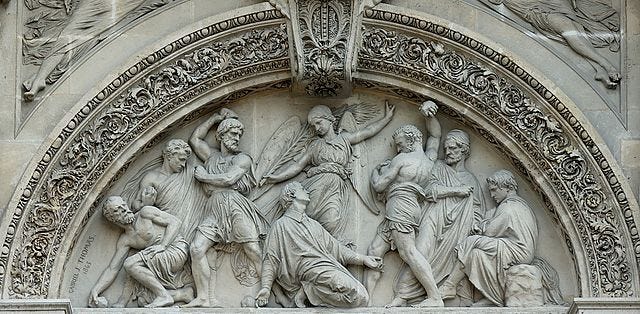"Be Not Dismayed": Discouragement and the Christian Life
Commentary/Reflection
One of the great challenges and crosses of the Christian’s ordinary life is discouragement, a sense that all our own work and little efforts seem without effect in a world that grows further and further from God. We may feel like Frodo in J.R.R. Tolkien’s Lord of the Rings: “I feel very small, and very uprooted, and well — desperate. The Enemy is so strong and terrible.” What are we to do?
Heaven knows that the current state of the Church and world offer sufficient reason to be discouraged. Government and society continually move further and further from Christianity; every day seems to bring news of some new depravity, and two years of COVID mitigation measures, largely useless for mitigating COVID, but which did greater harm in other realms.
Worse still, the Church seems no bulwark against the world’s evil. Within, dissent and liturgical abuse of all forms are tolerated, while traditional worship and faith is tarred as something dangerous. A new “synodal path” seems designed to introduce changes into Church teaching in the guise of greater “listening.” And this is to say nothing of the ordinary struggles, sins, and failures of our own daily life. One temptation for us is to withdraw, not to try struggling with powers far beyond us, and instead to focus on our own lives and families.
This is precisely what we must not do. We must recognize that the devil wants us to be discouraged, to convince us that we are helpless and that his own victory is inevitable. He wants us to retire and leave the field to himself and his own quislings. In Tolkien’s Return of the King, Denethor, last Steward of Gondor, expresses this despair as the enemy besieges the heroes: “Battle is vain… The West has failed. It is time for all to depart, who would not be slaves.”
But Gandalf replies, “Such counsels will make the enemy’s victory certain indeed.”
We cannot withdraw from the field, at least, not until death requires it or Our King commands it. Even though Christ has won the victory over the devil once and for all, our retreat would give the devil a victory over us. How then, can we resist the discouragement that seems so natural?
First, we need to improve our sense of perspective. Our natural sense of justice rightly rebels against the evil in the world, even in the Church. Surely, such injustice is not supposed to happen. Well, our sense is right, but our sight is too short. In this world, we should expect to lose. The prince of this world is the devil. We should be disappointed at the state of Church and World, but not surprised. Our Lord said, “In this world, you will have trouble, but take courage, for I have conquered the world” (Jn 16:33). In the end, the wrongs of this world will be righted, but not yet.
Scripture reminds us of this throughout. God’s message to Joshua might easily be meant for us: “Behold I command thee, take courage, and be strong. Fear not and be not dismayed: because the Lord thy God is with thee in all things whatsoever thou shalt go” (1:9). And St. Paul commands that we always be “steadfast and unmoveable… knowing that your labour is not in vain in the Lord” (1 Cor 15:58). And in a later letter, “For that which is at present momentary and light of our tribulation, worketh for us above measure exceedingly an eternal weight of glory” (2 Cor 4:17-18).
To this, we might add one more scriptural passage: “become as little children” (Mt 18:3). Why be like little children? Well, in trust and dependence on their parents, certainly, but there is another way as well. In his Ballad of the White Horse, G.K. Chesterton imagines King Alfred of England. Alfred had suffered defeat after defeat to the Viking invaders, but yet was not discouraged. Chesterton likened him to a good child at play, imagining a child building a tower of stones at the beach.

Through the long infant hours like days
He built one tower in vain-
Piled up small stones to make a town,
And evermore the stones fell down,
And he piled them up again…And as a child whose bricks fall down
Re-piles them o'er and o'er,
Came ruin and the rain that burns,
Returning as a wheel returns,
And crouching in the furze and ferns
He began his life once more.
The good child at play is not discouraged by his failures; his stones fall down, and he patiently rebuilds them. His labor seems in vain, but he labors on. Adults grow weary and discouraged, but the child builds on. Unless we are like a little child, we will not enter the kingdom of heaven.
Finally, there is one more reason we ought not be discouraged. Our discouragement often comes from the feeling that we labor alone or almost alone against greater powers: larger majorities, entrenched interests, and more powerful, connected people. But, here our sight is also wrong, or at least, again, too short. G.K. Chesterton once reflected, “When I fancied that I stood alone I was really in the ridiculous position of being backed up by all Christendom.” And St. Paul has told us not to lose heart, as we fix our eyes on the unseen not the seen, for “the seen is temporary, the unseen is eternal” (2 Cor 4:16-18). When we let our gaze grow too short, focusing on the seen, we may grow discouraged. When we fix our gaze on the unseen and eternal, we know we really have all of Christendom, angels, saints, prophets, an entire Church Triumphant, behind us.
Such a gaze belonged to St. Stephen, the first martyr of the Church. To worldly eyes, he was alone, surrounded by hostile forces set to stone him. But his eyes were on the unseen; he looked beyond his earthly enemies and saw the heavens opened and the Son of Man at the right hand of God (Acts 7:55).
We will have trouble in this world, and there are times when discouragement may come easily, but we are still to remain at our posts and work on, fixing our eyes on the unseen and knowing that in the Lord, we labor not in vain.
[edited 8:34, 5/20/22]


